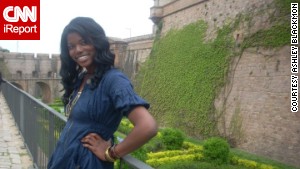Instead, she talked about the five months she spent studying and traveling in Spain.
"When I left the
interview, I felt amazing," said Blackmon, 24, who studied at ESEI
International Business School in Barcelona the year before she graduated
Clark Atlanta University. She landed that marketing analyst job at a
large food and beverage company and believes her study-abroad experience
was the thing that set her apart. "I learned how to be a better
businesswoman, critical thinker and relationship builder in a new
culture," she said.
 |
| Ashley Blackmon studied abroad in Spain. |
Studying abroad isn't a common experience for most U.S. college students. In fact, only 1% of students manage to study abroad.
Finances, time
constraints and safety are some of the challenges U.S. students face
when deciding to spend a semester or two overseas. But globetrotting
during or after college could give recent graduates an edge in the job
market, which continues to be one of the toughest on record for 20-somethings.
The potential benefits
are prompting new study-abroad initiatives in the States. Organizations
such as the Institute of International Education have launched programs
such as Generation Study Abroad in hopes of doubling the number of U.S. students who travel internationally.
An international push from the White House
First lady Michelle Obama is also working on efforts to promote more international travel among Americans. She's in China with her daughters and mother,
speaking about the importance of education, youth empowerment and the
benefits of studying abroad. The first lady conducted an exclusive
interview with CNN iReporters on Saturday, taking their questions on studying abroad.
"The benefits of studying
abroad are almost endless," Obama said during the CNN iReport
interview. "First of all, it is going to make you more marketable in the
United States. More and more companies are realizing that they need
people with experience around the world."
Howard Wallack, the vice president of a human resources trade group,
has experience as a hiring manager and was an international exchange
student. He says traveling abroad can introduce students to a host of
skills.
"Living in another
country, you learn to deal with a variety of people," he said. "You
learn to listen, be proactive, be patient, assertive. All those are
translatable skills." Wallack's experience
working in a rural health clinic in Guatemala after a major earthquake
helped him find compassion and resiliency within himself. "If you just stay in
your own country, you have a certain mindset about your own culture.
When you step out of that, you challenge your experiences and find out
about yourself, which can translate in the workplace," he said.
The problem is students
don't always know how to illustrate those experiences on paper. But some
colleges are taking steps to teach soon-to-be graduates how to leverage
their study abroad adventures for job interviews.
Take the trip, land the job
Heather White is the director of the Career Resource Center at the University of Florida.
With an enrollment of 50,000 students annually, she says the key to
standing out with your travel experience is to be strategic about how
you exhibit it.
"Some students tend to
write on their resume, 'study abroad France,' and that is it. We
recommend expanding on that experience. Did they volunteer, work,
study?" she said.
Jennifer Grasz, a spokesperson for job-posting site CareerBuilder, says to write out what you learned and how it's relevant to your professional performance on your resume.
"For example: Traveling
abroad has provided me with a greater knowledge and appreciation of
global communities and how to effectively navigate around communication
and cultural barriers," she wrote in an e-mail to CNN.
Ashley Putnam, a fellowship director for Idealist, an online resource for finding nonprofit jobs,
is a bit more skeptical about the career benefits of studying overseas.
"It depends on what they did," she explained. Running a public policy
program, she looks for applicants who are realistic about job
expectations.
"I find that people who
paid to volunteer abroad sort of just take pictures and hold babies,"
she said. "It depends on your study abroad program, too. Just having
studied abroad is good, but there is a whole other aspect to what you
did while you were there."
That's exactly what Alexa Basile
tried to keep in mind when she selected her study abroad program. The
State University of New York at Potsdam student spent a year in
Australia teaching social studies to a class of nine students.
 |
| Alexa Basile traveled to Australia for her study-abroad trip. |
It was during that
immersion with her students, many of whom had behavioral problems, that
she noticed her eighth-grade students were reading at a second-grade
level. That inspired her to focus on more critical reading lessons. "And
that made me realize I wanted to be a literacy specialist," she said,
which she is now emphasizing as she interviews for graduate school.
Like Blackmon, Basile
puts her study-abroad experience on her resume, but she also goes in
depth about her trip in her cover letter. She's candid with interviewers
about her successes and challenges overseas.
"I had times with this
class that were really tough, and sometimes frustrating," she said. Her
students routinely challenged her instructions, defied her and talked
back to her.
"But my very last day, I
walked into the classroom and they decorated it for me and they brought
me treats and toys," she said. "I broke down immediately. It really
proved to me they were tough, but they appreciated me."
Those frustrating and
rewarding moments helped hone her classroom management skills. After
Basile came back from Australia, she got her second student teaching job
at an inner-city school in New York City.
It's exactly that sort
of program involvement that Idealist's Putnam says will make hiring
managers care about a study abroad trip. "Be self-aware as you are doing
your job and take stock in what skills you are building. It's not just
'I go to a class and I teach the class,' " she said. "Be critical of the
work that you are doing."
Basile, who is
interviewing for graduate schools, says to approach studying abroad with
realistic expectations. "To get most out of your travel, you need to go
with the mindset that you are going to do a lot of things and be
involved," she said.
"Get hands on and look for a program that has those experiences. You can be a tourist on a family vacation."
Margaret Blaha, special to CNN, contributed to this story
Original posting: http://www.cnn.com/2014/03/25/travel/irpt-study-abroad/index.html?iref=allsearch
Original posting: http://www.cnn.com/2014/03/25/travel/irpt-study-abroad/index.html?iref=allsearch
